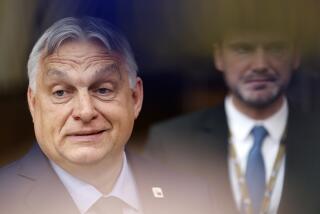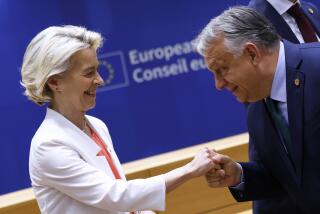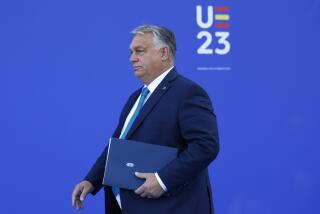Jozsef Antall; Hungary’s Prime Minister
ZAGREB, Croatia — Hungarian Prime Minister Jozsef Antall, who piloted his country through post-Communist upheaval to create the most stable democracy in Eastern Europe, died of cancer Sunday. He was 61.
Antall had been battling non-Hodgkin’s lymphoma, a form of cancer of the lymphatic system, for most of the nearly four years he headed Hungary’s first freely elected government.
The gruff, uncharismatic prime minister held fast to the reins of power to the end, holding Cabinet meetings in his hospital room and directing government affairs by telephone while on medical leave in Germany for bone marrow treatments.
The official MTI news agency reported that he died at the Budapest hospital where he was readmitted Nov. 23 with what was at first said to be influenza. His doctors conceded two days later that Antall had suffered a recurrence of the cancer said to be in remission after the marrow transplants in October.
Interior Minister Peter Boross, who had been filling in for the bedridden Antall since October, assumed the title of acting prime minister pending a decision by Parliament and Hungarian President Arpad Goncz about a date for new elections.
Under the Hungarian constitution, Parliament and Goncz must agree either to appoint a new prime minister to complete Antall’s term or to hold elections within three months.
Boross is an influential member of Antall’s Hungarian Democratic Forum, which holds the most seats in Parliament. He is reported by Forum sources to be the party’s most likely choice to run for the prime minister’s post in the next elections.
Antall’s death is expected to leave Hungary with a bout of the political uncertainty that has plagued most Eastern European countries since pro-democracy revolutions in 1989 threw off Communist rule.
Antall was the only leader in the region to escape early ouster from social unrest brought on by the painful transition from a centralized to market economy.
But his popularity suffered in recent months because of declining living conditions. The latest opinion polls show the Forum trailing at least two more liberal parties.
Nevertheless, Goncz lamented in a televised tribute, Antall “was convinced the only road for Hungary was that of democracy. It is a pity he died so soon he was unable to fulfill his personal wish to lead his country to the next election.”
Antall emerged from relative obscurity in 1989 to take part in round-table negotiations between opposition parties and the Communists who then held all power. The talks led to the first multi-party elections in Eastern Europe since World War II, a March, 1990, vote that saw Antall elected prime minister.
He built a center-right coalition of Christian, democratic and agrarian parties that oversaw a boom in foreign investment and relative success, by the troubled region’s standards, in taming inflation and unemployment.
Government officials sought to play down the seriousness of Antall’s illness until he was hospitalized last month.
On Saturday, Goncz went to Antall’s bedside to bestow the Grand Cross of the Order of the Republic of Hungary, a decoration honoring his contributions to the restoration of democracy and independence in Hungary, but also a signal that his condition had seriously deteriorated.
No funeral date has been announced.
Williams, chief of The Times’ Vienna bureau, was recently in Hungary.
More to Read
Sign up for Essential California
The most important California stories and recommendations in your inbox every morning.
You may occasionally receive promotional content from the Los Angeles Times.











